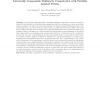Free Online Productivity Tools
i2Speak
i2Symbol
i2OCR
iTex2Img
iWeb2Print
iWeb2Shot
i2Type
iPdf2Split
iPdf2Merge
i2Bopomofo
i2Arabic
i2Style
i2Image
i2PDF
iLatex2Rtf
Sci2ools
120
click to vote
TCC
2009
Springer
2009
Springer
Universally Composable Multiparty Computation with Partially Isolated Parties
It is well known that universally composable multiparty computation cannot, in general, be achieved in the standard model without setup assumptions when the adversary can corrupt an arbitrary number of players. One way to get around this problem is by having a trusted third party generate some global setup such as a common reference string (CRS) or a public key infrastructure (PKI). The recent work of Katz shows that we may instead rely on physical assumptions, and in particular tamper-proof hardware tokens. In this paper, we consider a similar but strictly weaker physical assumption. We assume that a player (Alice) can partially isolate another player (Bob) for a brief portion of the computation and prevent Bob from communicating more than some limited number of bits with the environment. For example, isolation might be achieved by asking Bob to put his functionality on a tamper-proof hardware token and assuming that Alice can prevent this token from communicating to the outside world...
Composable Multiparty Computation | Cryptography | Standard Cryptographic Assumptions | Tamper-proof Hardware Token | TCC 2009 |
Related Content
| Added | 25 Nov 2009 |
| Updated | 25 Nov 2009 |
| Type | Conference |
| Year | 2009 |
| Where | TCC |
| Authors | Ivan Damgård, Jesper Buus Nielsen, Daniel Wichs |
Comments (0)

